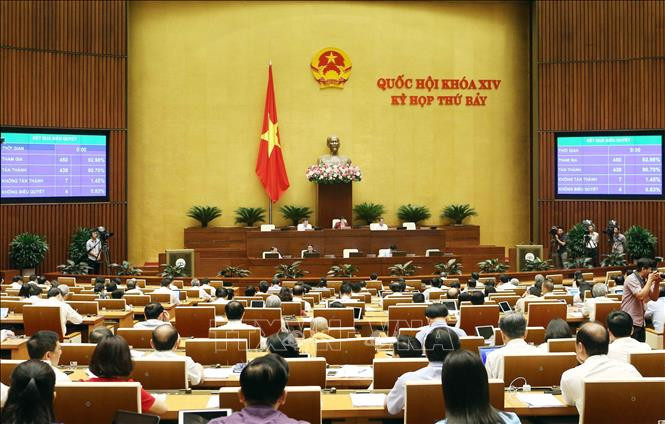7th Session, 14th National Assembly: Passing the Law on Tax Administration (amended)
On the morning of June 13, with 91.32% of delegates in favor, the National Assembly passed the Law on Tax Administration (amended).
 |
| Scene of the meeting on the morning of June 13, 2019. Photo: Doan Tan/VNA |
The Law consists of 17 chapters and 152 articles regulating the management of taxes and other revenues of the State budget.
The Law clearly stipulates the rights of taxpayers. Accordingly, taxpayers are supported and guided in tax payment; provided with information and documents to fulfill tax obligations and rights; and receive documents related to tax obligations from competent authorities when conducting inspections, audits, and checks.
Taxpayers are entitled to request tax authorities to explain tax calculation and determination; to request agencies and organizations to appraise the quantity, quality and types of exported and imported goods; to keep information confidential, except for information that must be provided to competent State agencies or public information on taxes as prescribed by law; to enjoy tax incentives and tax refunds as prescribed by law. In addition, taxpayers are entitled to compensation for damages caused by tax authorities and tax officials as prescribed by law; to complain and file lawsuits against administrative decisions and administrative acts related to their legitimate rights and interests; to not be handled for tax violations, and to not be charged late payment fees in cases where taxpayers comply with guidance documents and handling decisions of tax authorities and competent State agencies related to the content of determining taxpayers' tax obligations...
Regarding the responsibilities of taxpayers, the law stipulates: Taxpayers must register for tax and use tax codes according to the provisions of law; declare taxes accurately, honestly, completely and submit tax records on time; be responsible before the law for the accuracy, honesty and completeness of tax records; pay taxes, late payment fees, and fines in full, on time, and at the right place...
According to Article 85 of the Law on Tax Administration (amended), cases of tax debt, late payment fees, and fines being cleared include: Enterprises and cooperatives declared bankrupt have made payments according to the provisions of the law on bankruptcy but have no assets to pay tax, late payment fees, and fines; Individuals who have died or have been declared dead by the court, or have lost civil act capacity, and have no assets, including inherited assets, to pay outstanding tax, late payment fees, and fines; Taxpayers' tax debts, late payment fees, and fines not falling under the above cases for which the tax administration agency has applied coercive measures and these tax debts, late payment fees, and fines have been over 10 years from the tax payment deadline but are not recoverable...
Previously, in the report explaining the acceptance and revision of the draft Law, Chairman of the National Assembly's Finance and Budget Committee Nguyen Duc Hai said that there were opinions from delegates that Article 85 stipulates the conditions for debt cancellation, while the debt cancellation amounts of 5 billion VND, 10 billion VND, 15 billion VND are all focused on enterprises and cooperatives, but the draft Law only stipulates that the Chairman of the Provincial People's Committee decides after an enterprise or cooperative is declared bankrupt without stipulating the amount of money that can be canceled. For business households, the cancellation is after 10 years, but enterprises and cooperatives do not see any regulations on how many years the cancellation period is or if they meet the bankruptcy conditions, they are eligible for immediate debt cancellation.
Chairman of the National Assembly's Finance and Budget Committee Nguyen Duc Hai stated that Article 85 stipulates debt cancellation for three subjects: enterprises and cooperatives declared bankrupt by the court and having no assets to pay taxes (in Clause 1, Article 85); individuals who have died or lost civil capacity and have no assets to pay taxes (in Clause 2, Article 85); tax debts that have been over 10 years old and tax authorities have applied enforcement measures but are unable to recover them (in Clause 3, Article 85).
For bankrupt enterprises and cooperatives, the procedures are implemented according to the provisions of the law on bankruptcy as shown in Clause 1, Article 85 and for individuals as shown in Clause 2, Article 85 of the Bankruptcy Law. The draft Law stipulates that the authority to cancel debt is assigned to the Chairman of the Provincial People's Committee, so in the case of bankrupt enterprises and cooperatives, the debt must be over 10 years old and the amount of debt cancellation is not specified (there is no limit on the amount of debt cancellation).
For corporate debts that have been over 10 years old and that the tax authorities have applied enforcement measures but are unable to recover (in Clause 3, Article 85), the draft law stipulates the authority to write off debts as follows: under 5 billion VND is assigned to the Chairman of the Provincial People's Committee; from 5 to 10 billion VND is assigned to the Director General of the General Department of Taxation, Director General of the General Department of Customs; from 10 to 15 billion VND is assigned to the Minister of Finance and over 15 billion VND is assigned to the Prime Minister. Therefore, the Standing Committee of the National Assembly requests the National Assembly to allow keeping it as in the draft law.
